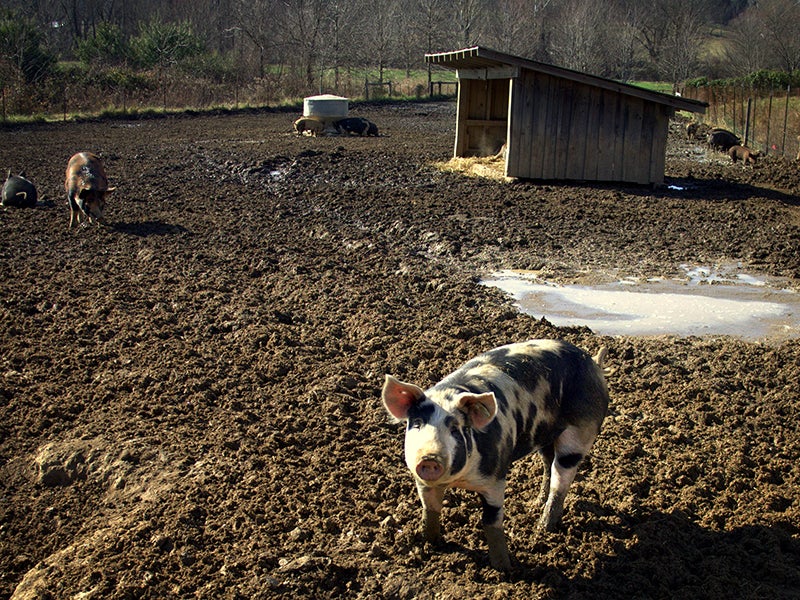Hogwash from the Pork Industry
The biggest agribusiness companies in the world want you to think they’re standing up for small family farms—but that’s a load of manure.

This page was published 10 years ago. Find the latest on Earthjustice’s work.
This fall, many North Carolinians found a cheery recording left on their answering machines:
Hi, this is Nannette Sutton, a North Carolina hog farmer calling on behalf of the North Carolina Pork Council with a message about hog farming in our state. I’m proud to be part of an industry that’s responsible for thousands of well-paid jobs. More than 46,000 North Carolinians rely on the pork industry for their livelihood, with an average annual wage of nearly $40,000. Please visit www.ncpork.org to learn how hog farmers are strengthening North Carolina communities and helping our local economy. This is paid for by the North Carolina Pork Council.
You might think this is just the voicemail equivalent of an infomercial. Perhaps it conjures up the image of a friendly local farmer watching over a herd of happy pigs or a bustling farmers’ market where customers pay top dollar for locally raised pork.
If you live next to a typical modern-day hog farm, though, you know that’s not what reality looks like. There are about 2,100 hog farms in North Carolina raising just under 10 million hogs. That’s an average of 5,000 hogs per farm. These are industrial operations, not bucolic barnyards. Such large-scale hog farms produce a lot of pork, but they also produce huge amounts of hog urine and feces.
For many years, the standard way of dealing with that hog waste has been to store it in massive, open-air cesspools and then spray it onto nearby fields. This leads to dangerous contamination of nearby waterways with fecal bacteria, nitrates, phosphorus and parasites, not to mention unimaginable odors. Neighbors have no choice but to endure the stench, pollution and health impacts, such as respiratory problems, burning eyes, headaches and spikes in blood pressure.
The Pork Council’s voicemail doesn’t mention any of those problems, preferring to focus on jobs and wages instead. But even there, the message rings hollow. In Duplin County, North Carolina, where there are more pigs per capita than anywhere else in the country, median household income is only about $34,000 (that’s household income, not individuals’ wages), and more than a quarter of the population lives in poverty. Meanwhile, the handful of corporations that control U.S. pork production are raking in billions of dollars in revenue every year. You can bet that that money isn’t staying in the local economy—especially since Smithfield Foods, which runs the world’s largest slaughterhouse in Tar Heel, North Carolina, was purchased by a Chinese holding company in 2013.
The consolidation of the pork industry hasn’t been good for the family farm. As is true in most of the country, the number of farms and farmers in North Carolina has been steadily decreasing, while the average size of farms has gotten larger and larger. The number of North Carolinians employed by hog farming makes up less than one half of one percent of the state’s population (9.94 million people as of the 2014 census).
In part, the decline is occurring because it’s harder and harder to make a decent living as a farmer, thanks to the dominance of big agribusinesses. These days, most hog farmers don’t own the hogs they raise. Rather, the farmer is under contract with a multinational corporation, which owns the hogs from conception to slaughter and dictates exactly how the farmer must raise them. In this scheme, the farmer does most of the work and bears most of the costs and risks, but the corporation gets most of the profits.
The North Carolina Pork Council probably wouldn’t be paying for thousands of robo-calls if they weren’t desperate to make a bad industry sound better than it is. Don’t believe the hype—North Carolinians deserve better. That’s why Earthjustice is partnering with state and local organizations to stand up for clean air, clean water and accountability from these so-called “integrator companies” that own the hogs “from squeal to meal.” We’re also taking on the hog industry on civil rights grounds for the impact hog feces and urine have on nearby low-income communities of color. Join us in sending the pork industry’s propaganda out to pasture.
Established in 2008, Earthjustice’s Northeast Office, located in New York City, is at the forefront of issues at the intersection of energy, environmental health, and social justice.